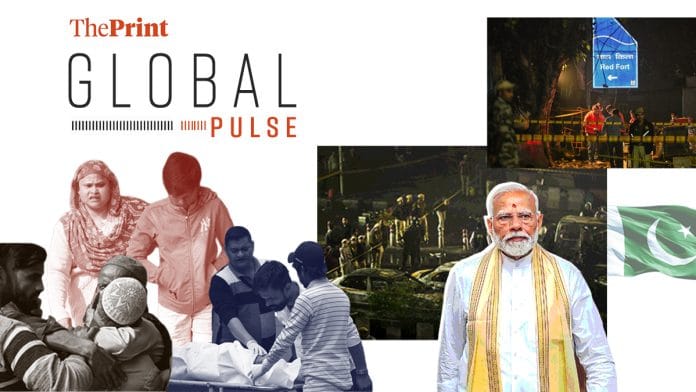New Delhi: In The New York Times, Mujib Mashal reports on the aftermath of Monday’s blast near Red Fort in Delhi that killed 12. “The police appeared to be narrowing the focus of their investigation to a possible terrorist attack,” says the report, adding that much of the investigation has focused on the “movement of the vehicle and its driver”.
“The blast on Monday came at the end of a day when the Indian police said they had disbanded an ‘interstate and transnational terror module’. They said they had confiscated several weapons and a large amount of bomb-making material that the police said was linked to Jaish-e-Mohammed, a Pakistan-based group long accused of attacks in India.”
“After the attack in Kashmir this spring, which hit a tourist picnic spot, India carried out airstrikes in Pakistan targeting facilities of the group,” it adds.
The report also notes that India “frequently accuses” Pakistan of orchestrating terror attacks and that at the time of the Pahalgam attack, the Modi government had said any future terrorist attack would be treated as “an act of war”.
The Jammu & Kashmir Police have made more than half a dozen arrests and confiscated “over 6,000 pounds” of material that “could be used” to make bombs, it says.
Pakistan has accused India of being behind a suicide bombing that killed 12 people outside the Islamabad court complex, reports Humza Jilani in Financial Times. The bombing as well as a separate assault on a college near the Afghanistan border have been referred to as the “worst examples of Indian state terrorism in the region,” says FT.
“It is time for the world to condemn such nefarious conspiracies of India,” according to a Pakistan government post on X quoting Prime Minister Shehbaz Sharif. The FT report says the post “offered no evidence” for Pakistan’s allegation that the “attacks were carried out by insurgents supported by New Delhi”.
“The attack came amid tensions between Pakistan and neighbours Afghanistan and India, which Islamabad accuses of sponsoring and supporting militants in its territory. New Delhi and Kabul both deny any involvement in terrorism in Pakistan, and accuse Islamabad of using allegations of such involvement as a pretext to destabilise both nations,” it states.
It notes that the Indian government dismissed the accusation as a “desperate diversionary ploy intended to distract Pakistanis from an ongoing military power grab”.
“The nuclear-armed neighbours have long accused each other of supporting terrorists and separatist groups on their territories and fought a brief but fierce conflict in May,” the report adds, acknowledging the precarious state of affairs between India and Pakistan.
Financial Times also reports on PM Modi saying “conspirators” behind New Delhi explosion will “not be spared”.
“The blast sparked speculation of a potential link to terrorism, a perennial concern in India, which has suffered numerous attacks in recent decades, including several in New Delhi since the mid-1990s,” write Andres Schipani and Jyostna Singh.
In the BBC, Vikas Pandey and Antriksha Pathania speak to witnesses of the Red Fort blast and trace all that transpired Monday night. “Among the crowd were also several people who were looking for missing family members. One of them was Mohammed Azghar, whose brother was in the area where the blast took place,” says the report.
“My brother has been missing since the explosion. We haven’t had any contact with him,” he is quoted as saying. “We’ve searched around Red Fort, Chandni Chowk, everywhere but we can’t find him.”
Ram Singh, who “drives a small vehicle”, was worried about business being affected. “I earn daily and I am worried how I might feed my family. I hope a sense of security soon returns. I hope the police will be able to restore trust fairly quickly. And I hope this never happens in our city ever again. We are shaken but we should overcome this,” he tells the BBC.
(Edited by Nida Fatima Siddiqui)
Also Read: Delhi & Beijing search for new normal & why India can be the ‘juggernaut’ of women’s cricket






